Pulikaachal was the first dish that I cooked once I finalised Tamilnadu theme for the mega BM – JTTC (Journey Through The Cuisines)…
Pulikaachal comes from Puli =Tamarind, and Kaachal = to heat. so basically, tamarind paste is spiced and preserved as a spicy , comforting paste . Pulikaachal is the paste that is mixed with rice to make tamarind rice aka Puliyodharai, offered as prasad or naivedyam in most South Indian Vaishnavite temples – A specialty of the Iyengar community, it even finds mention in 10th Century inscriptions and the literature of the 4th Century A.D.
It took me a little over 2 years to understand this dish (no, not to cook it, but to understand it better) and a further 10 years to make it from scratch…. read on to learn more….
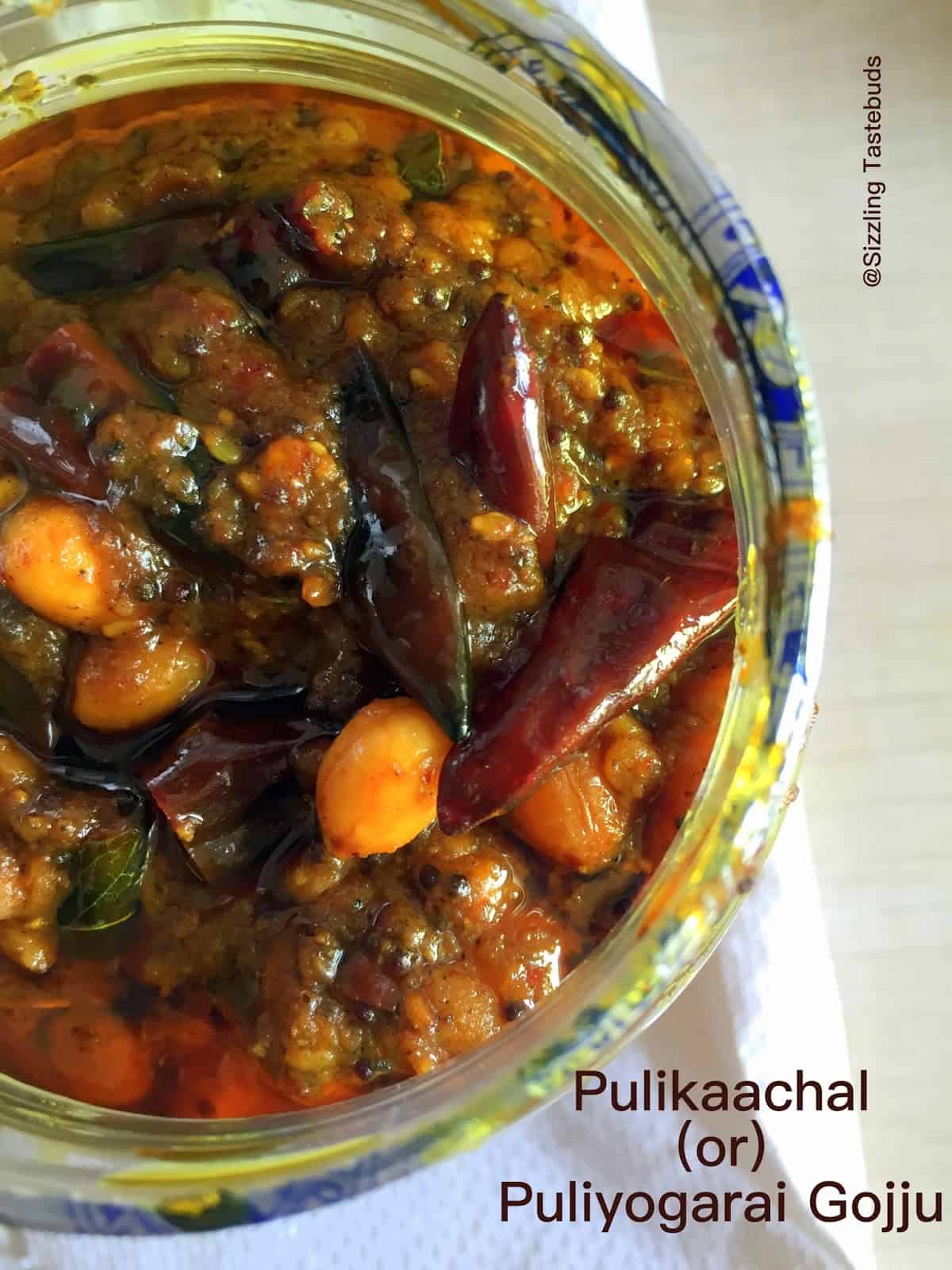
Fundamentally, for the Non-Tamilnadu cooks, Puliyogarai (made in the Kannada / Mysore style) as described here – with what is called Puliyogorai gojju, which was what amma used to make for most festival spreads.
But Pulikaachal …. well…. was another Tamilnadu beast waiting to be tamed.
In the pre-blogging days, and when we still craved to access the internet in a cyber cafe, emailing was considered a luxury, so there was no whatsapp or emails from mom or MIL to bail me out 😀
Well, am digressing.
Having the Convenience (??!!) of not living with my in laws, I still didn’t know how to make this condiment considered by many Tamil brahmin households as a delicacy, no less 🙂 It took many years of prodding by the husband, and many more years of procrastination later, I finally decided to make this
(I couldn’t imagine a Tamil based Mega BM without a pulikaachal recipe, so you know what the real driver was !! Shhhhh.. lets keep that secret amongst ourselves, shall we ? :))
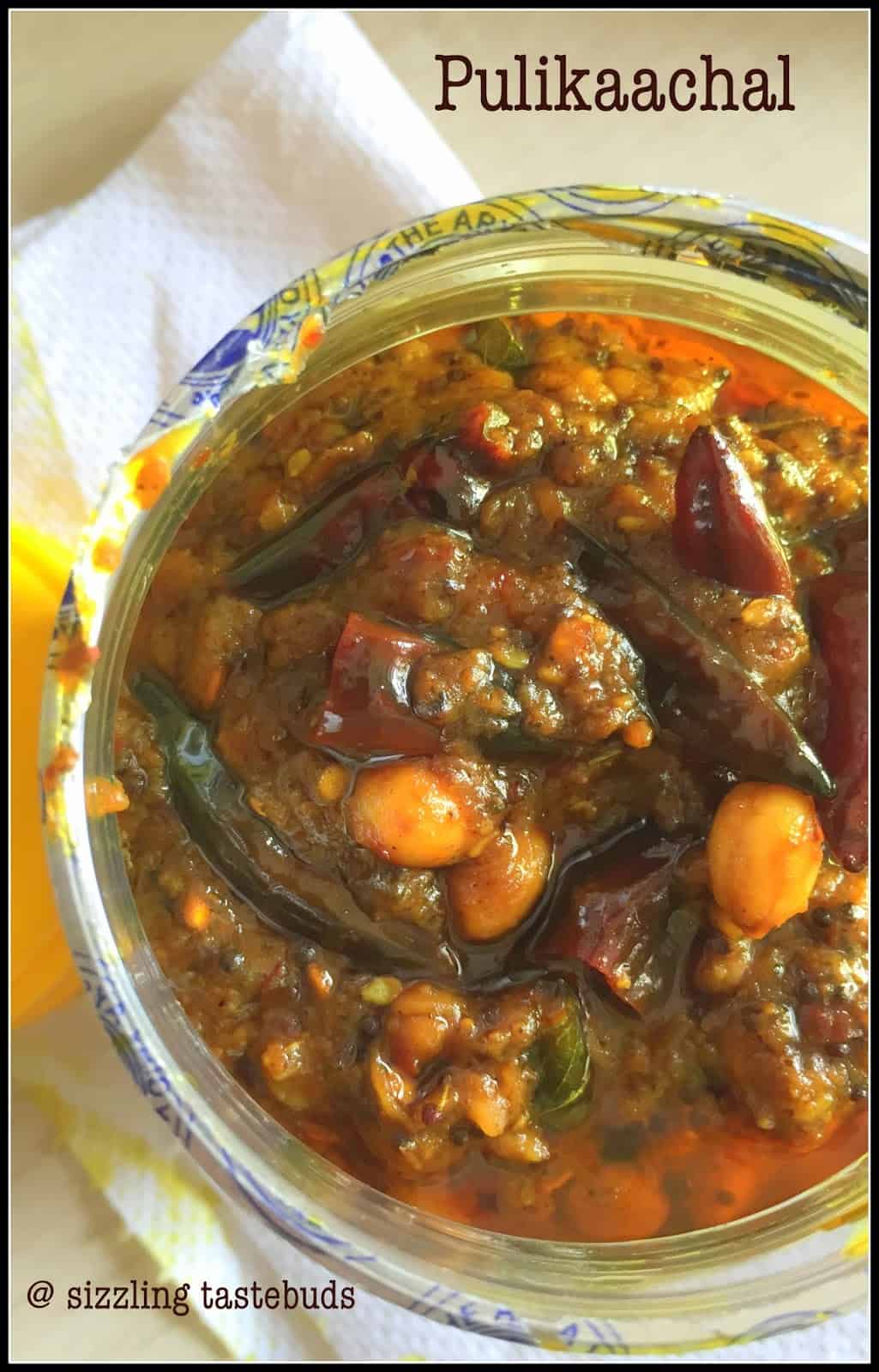
Recipe books without pictures dont interest me, however rich the text is. and I was looking for an authentic dish made by Chennai / Tamilnadu based authors / foodies / bloggers. So stumbling upon this recipe, this was one of the recipes I actually read and re-read atleast 9-10 times before attempting it. I made my little variations based on what I had tasted before.
And the husband couldn’t actually believe I had made it. A bucketful of compliments later, I was ready to make a second batch soon, and here are the step by step pictures which helped me as a novice cook – which would help another of our guild in search of authentic Tamil recipes.
PS : There are probably a hundred different ways to make this, each varying from household to household (including differing what my MIL makes too !!) , but the husband said this is exactly how he remembers savouring this condiment mixed with hot rice and topped with sesame oil.
So, lets get to the recipe, shall we ?
Pulikaachal – a Tamarind based condiment / Dip , also a base paste to make Puliodhorai (a rice based offering to God)
Prep time : 20 mins, Cook time : 30 mins ; Makes : approx 200-225 gms of Pulikaachal
Keeps upto 2 months under refrigeration
Ingredients:
- Sesame Oil / Nallennai / Til ka tel – 1/2 cup + 4 TBSP
- Tamarind / Imli / Puli – 100 gms
- Channa dal / Bengal gram / Kadalai paruppu – 2 TBSP
- Urad Dal / Ulutham paruppu – 2 TBSP
- Whole red chillies – 15 nos (I used pandi variety mirchi – you could sub with Guntur variety)
- Mustard seeds – 1 TBSP
- Peanuts – 3 TBSP
- Turmeric – 1 tsp
- Asafoetida – 1 TBSP
- Jaggery – 2 TBSP
- Curry leaves – 4 to 5 sprigs
- Salt – to taste (about 1.5 tsp)
- Ellu / Sesame seeds – 1 TBSP (opt.) – black works better than white here
- Dry Copra – 2 TBSP
For Spice powder: (Adjust spice according to taste)
- Coriander seeds / Malli – 3 TBSP
- 2 TBSP channa Dal
- 1 TBSP urad dal
- Black pepper – 2 TBSP
- Fenugreek seeds / Vendhayam / Methi dana – 1/2 tsp
- Curry leaves – 2 sprigs (opt.)
- Red chilli – 5 to 6 (I used 2 kashmiri and 4 Guntur variety)
Method:
Stage 1 : Roast all spices for spice powder separately in 1 tsp of oil. Cool and grind. Divide spice powder into 2 parts : 2/3 and 1/3 portions respectively.
Soak tamarind in hot water for 1/2 hour, extract the pulp
Roast dry copra and sesame separately
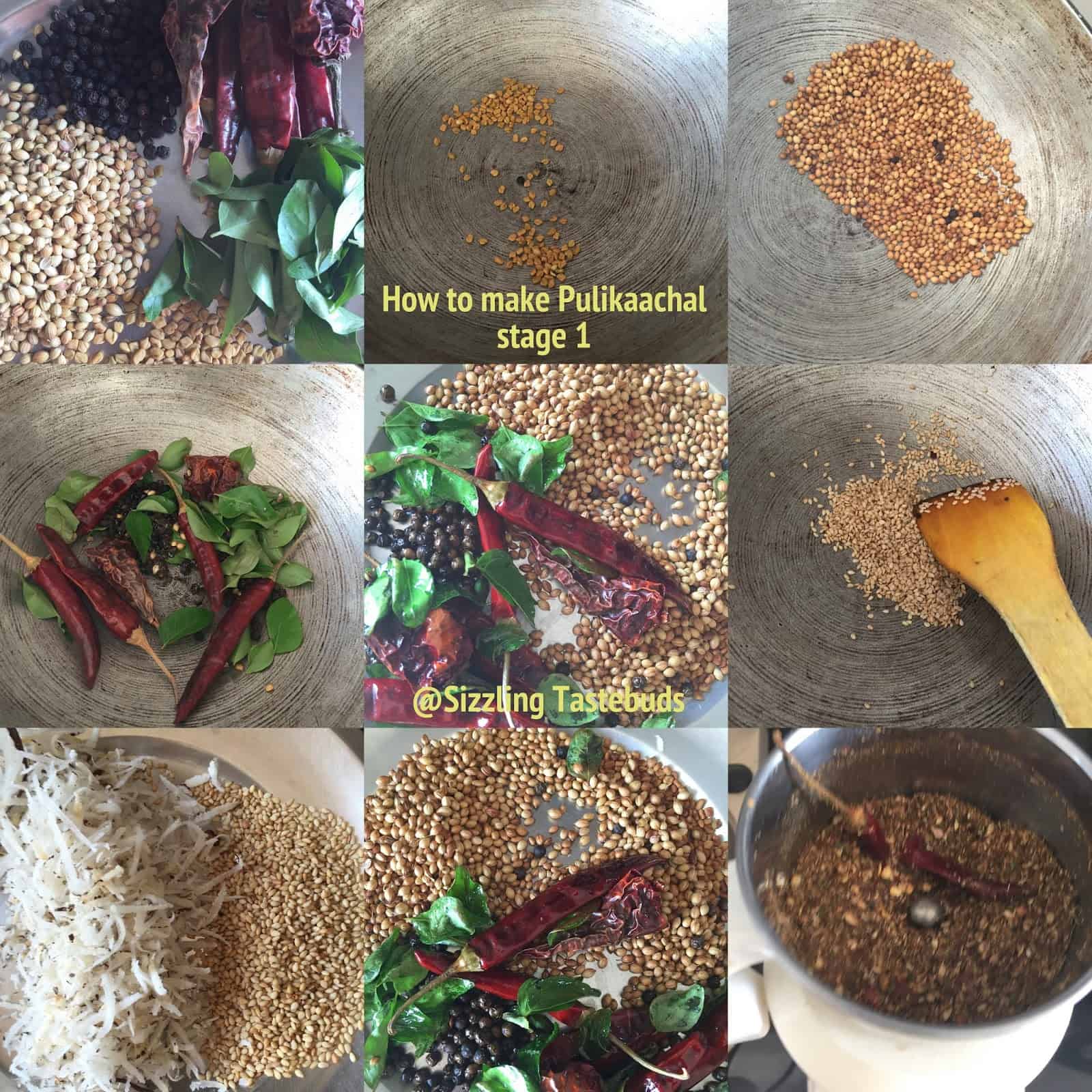
Stage 2:
Heat the deep bottomed thick kadai (if you have a cast iron pan, it works best). When the oil is heated, add peanuts and fry well till golden brown. remove only the peanuts to a plate with a slotted spoon,
Now add mustard seeds, turmeric, hing, curry leaves, broken red chillies, Urad and Channa dal and fry till dals turn golden brown, Now add the tamarind pulp with the water too. Add salt, 2/3 of the ground spice powder and jaggery.
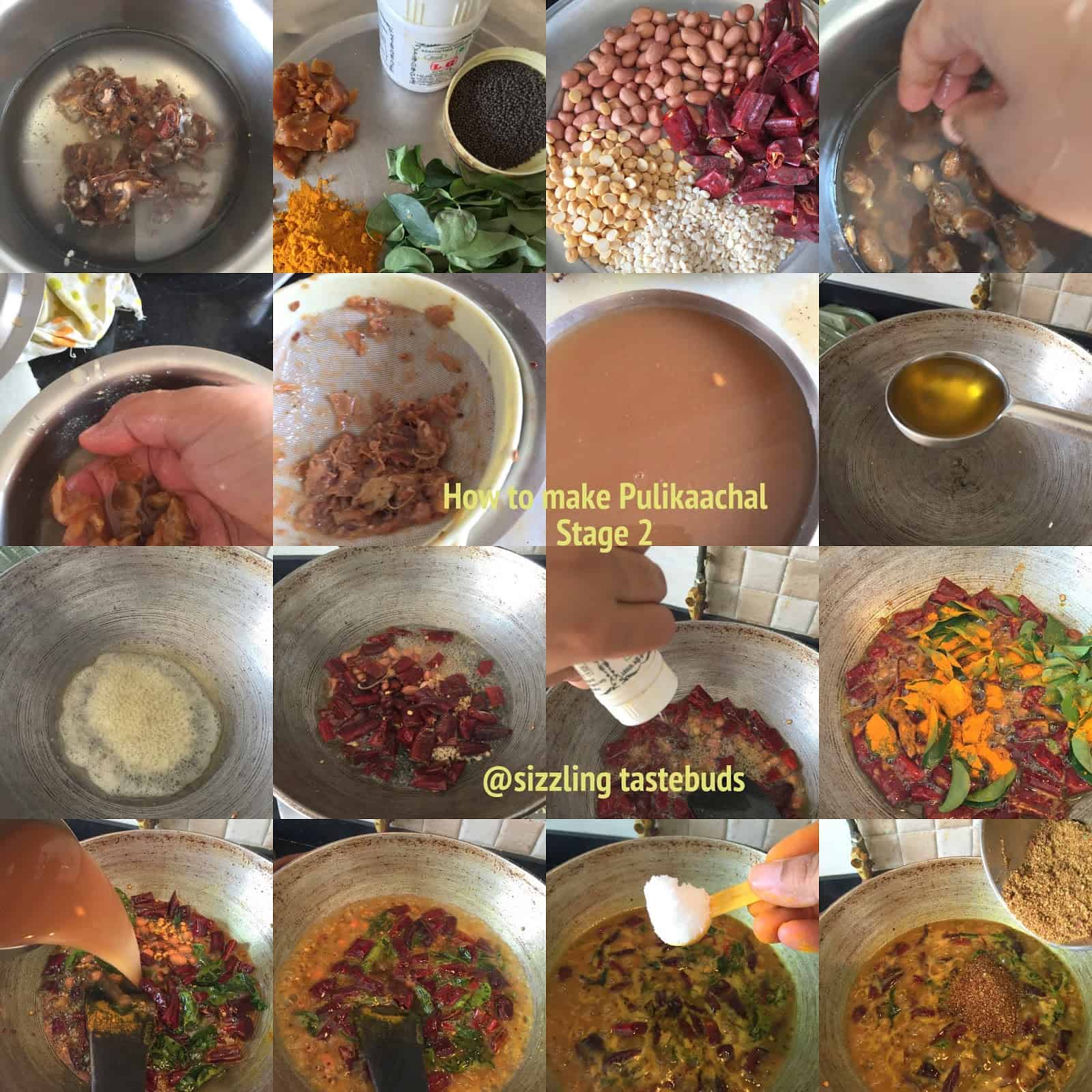
Stage 3;
Let it cook on medium flame for 10-12 mins till the water evaporates and it becomes a thick pulp, the oil will spurt quite a bit so place a lid halfway, and away from your face.
Once the mixture thickens even further and coats the back of a spoon (alternatively, the oil starts leaving the sides and the mixture starts simmering in slow spurts), turn off and add the fried peanuts , roasted copra and sesame seeds and mix well
Let it completely cool.
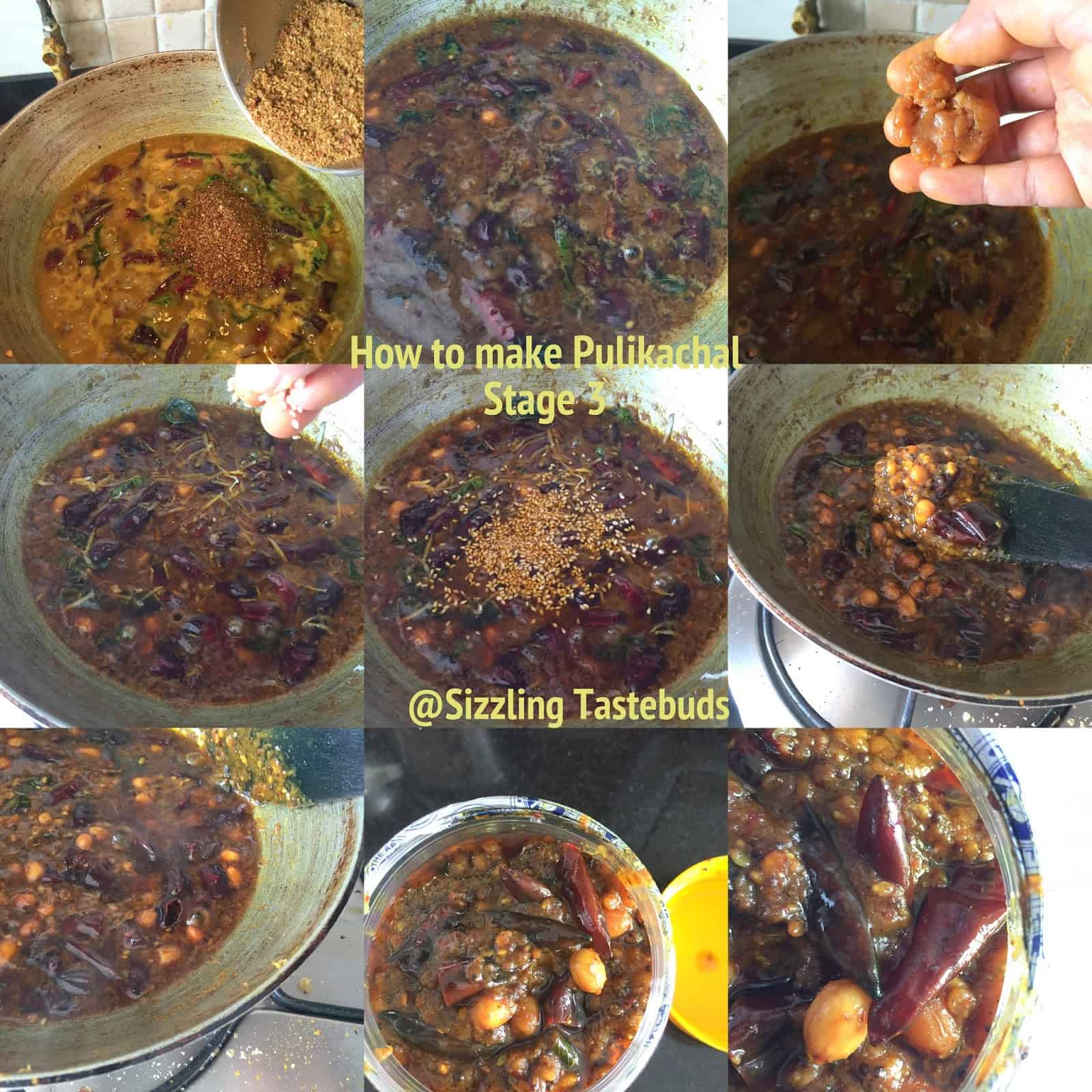
Transfer to airtight sterile steel / glass container.
If you feel the gravy has thickened too much, heat addition 1/4 cup sesame oil, cool COMPLETELY and add to the mixture before bottling.
Keeps for upto 2-3 months under refrigeration.
Apart from making Puliogorai, this is also a great side dish for Curd Rice.
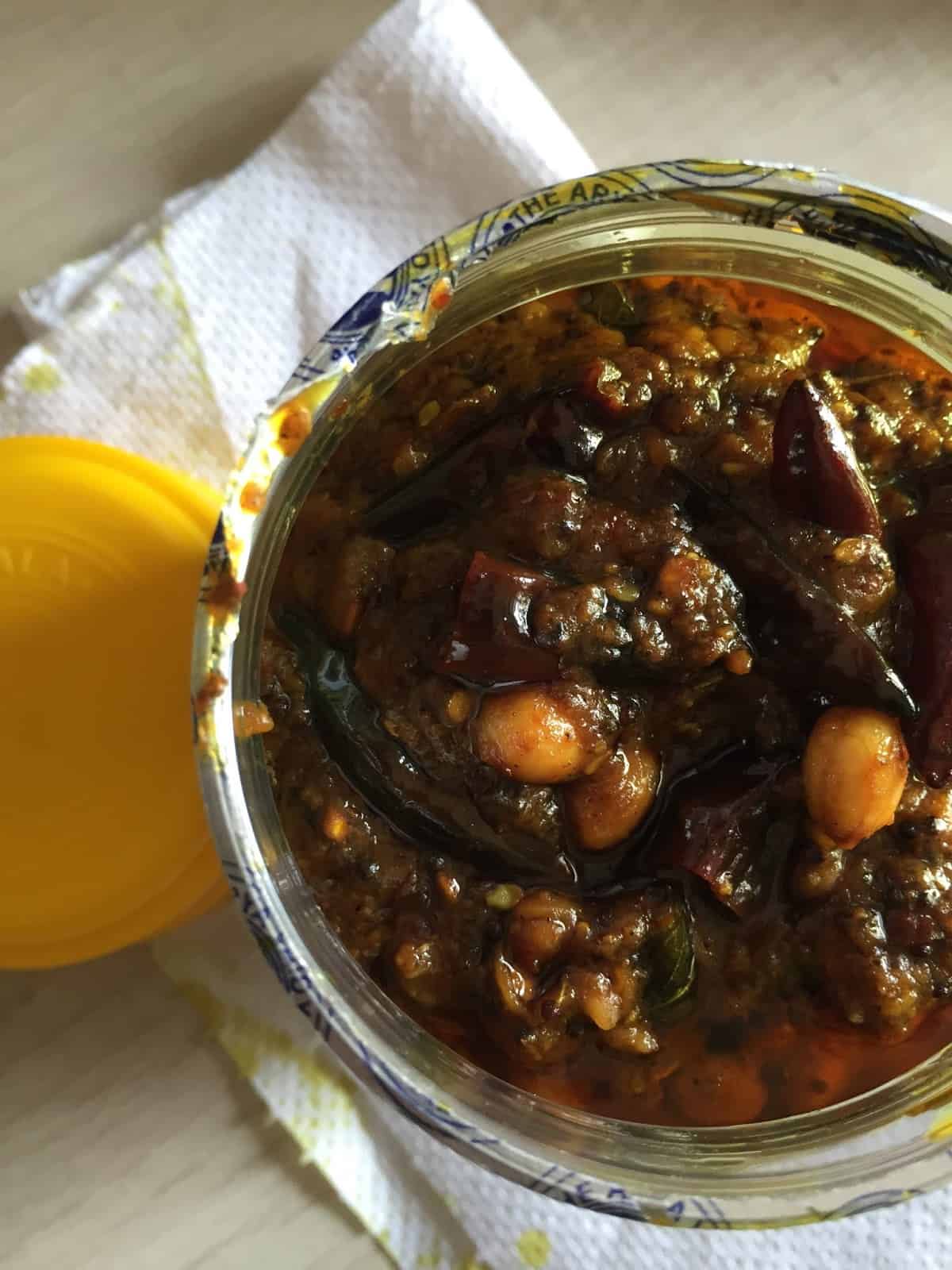
To make Kovil Puliyodharai / Puliyogarai, Cook rice into separate grains, Add requisite Pulikaachal paste, the remaining spice powder and mix well. Serve immediately.



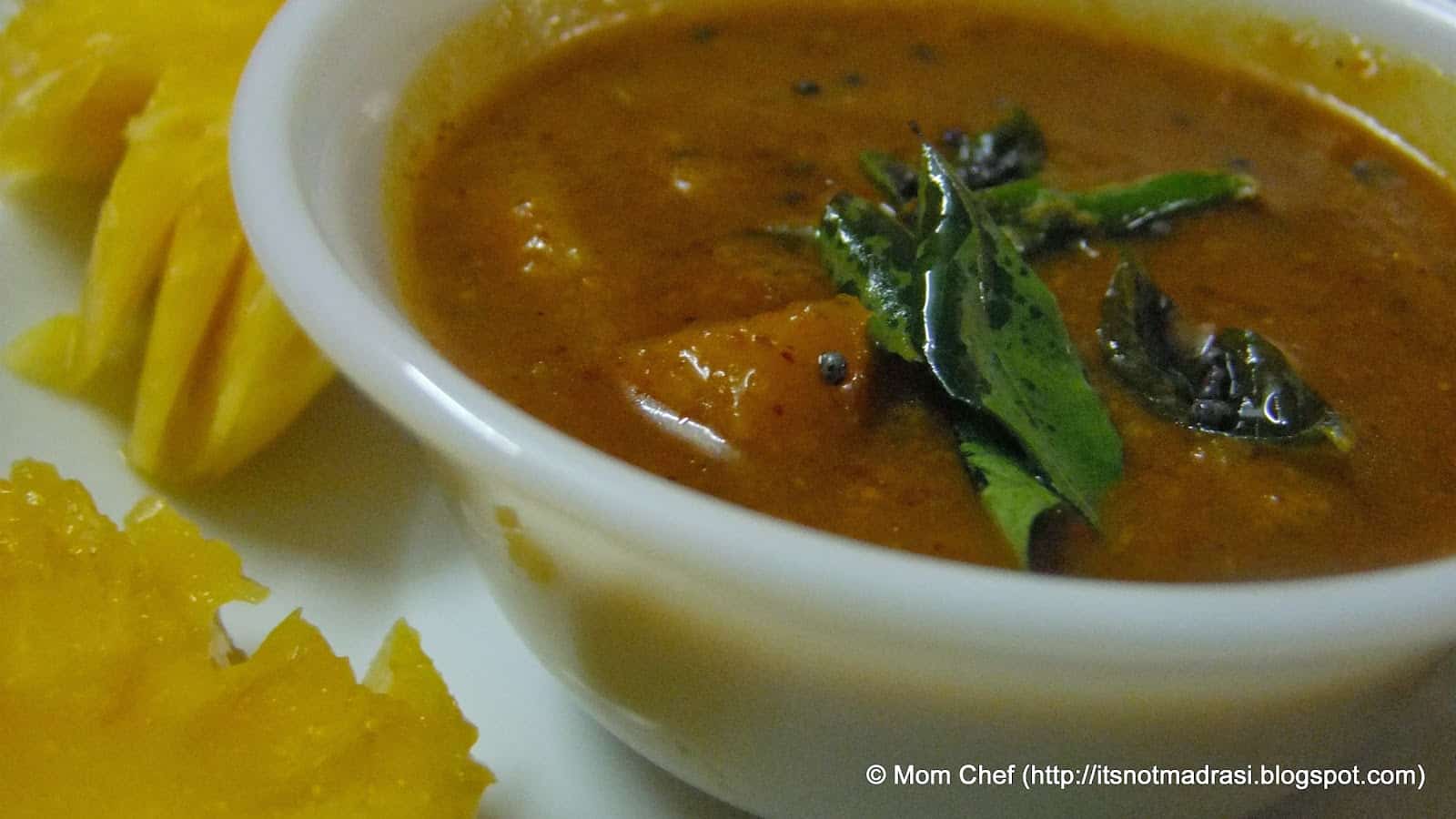


I love this and the pulihodarai as well..good one..glad you finally made it..
Mouthwatering!! Good you finally nailed the recipe. I
So delicious. I am drooling here looking at the picture..
Will try out this version soon. My husband too is a fan of tamarind rice and I don't make it often. My own recipe keeps varying in taste because of the tamarind and chillies not being the same every time I use them.
I guess my husband would worship me if I nail this, ????
invite me over…i make this the hydu style ever since i shared a room with one my friends a decade ago, but ofcourse i had no baggage of benchmark at home, so for me making this much easier…but i can completely relate to the state of your mind when compared to some of dishes that are like family treasures
yum.. kattu saada koodilai la pulikaichal ellama onnume nadakadu. love this
Drooling Kalyani ! The whole recipe sounds so killing man ! Just loving it and trust me want to try this right away . Lovely tempting clicks .
Mouthwatering!! Love all the clicks:)
It took me a while to wrap my head around pulikachal too Kalyani. Our Andhra pulihora is very basic and simple — tamarind paste mixed with rice and the tempering — that's it. So this Tamil version looked so elaborate and time consuming — but it tasted sooo much different and delicious from what I was used to. It was fun reading your experience with the dish.
Just love it, pulikachal is a life saver and i make it quite often as this paste is quite handy.
Perfectly made. I make the pulihora paste in a similar fashion with little changes to the spice powder. But never tried in large quantities. Sounds like a good idea.
An absolutely new dish for me, I loved the way you have made it. Amazing pick for P!
My mother's recipe is almost similar to this except we don't add the kopra. Lip smacking dish and an absolute must in my refrigerator 🙂
Omg I am drooling over the pics.This is so good ,mouthwatering dish.
all those flavorings -must taste awesome!
Would like to know if this can be used to make puliyogare for traveling
yes, it most definitely can be used. It is similar to the puliogre gojju that we make in Karnataka, yet has some difference in the ingredient list